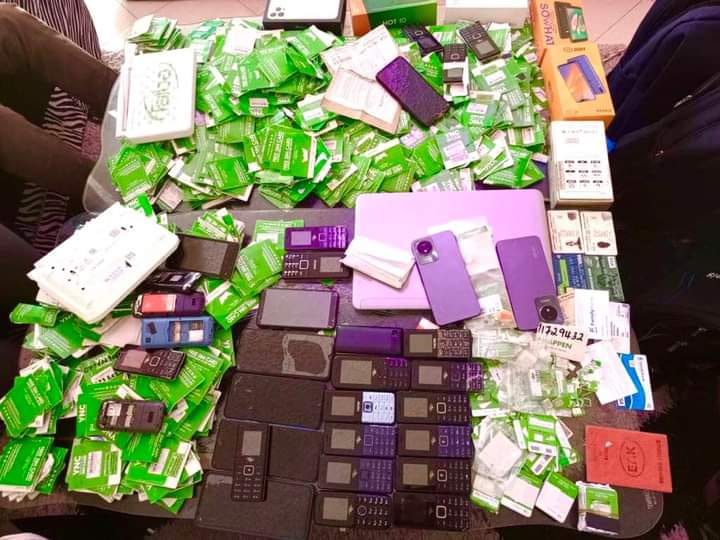This team registered 23000 Safaricom SIM cards and ‘Fuliza’ over Ksh444 Million..

A recent high-profile case in Kenya involves a fraud syndicate that registered around 23,000 Safaricom SIM cards and exploited the “Fuliza” overdraft service, accumulating an estimated Ksh 500 million in debt before disappearing. Eight suspects, aged between 24 and 30, were arrested by the Directorate of Criminal Investigations (DCI) in Nakuru and Trans-Nzoia counties. They allegedly used falsified identity cards to register the SIM cards and built up their Fuliza credit limits through initial repayments. Once each card reached its maximum loan limit, they would default on the loans, leaving the accounts inactive.


The investigation revealed that the group had also acquired various assets, including cars and motorbikes, using the fraudulently acquired funds. Authorities recovered numerous items, including mobile phones, laptops, routers, ATM cards, and over 1,000 Safaricom registration forms, believed to be connected to the scheme. The DCI is conducting further inquiries to understand the extent of the fraud before the suspects are formally charged in court.
This case highlights a significant security challenge within Kenya’s mobile money and loan services, underscoring the need for enhanced identification measures to prevent similar incidents in the future
Safaricom SIM Card Syndicate: Uncovering Kenya’s Mobile Money Security Challenge
====================================================================
The rapid development of mobile money services has undoubtedly brought about numerous benefits to users. However, recent events in Kenya have exposed the darker side of this convenience, revealing the existence of sophisticated fraud syndicates that exploit vulnerabilities within the system. In this blog post, we will delve into a recent high-profile case involving a Safaricom SIM card scam and explore the security challenges it presents.
Chapter 1: The SIM Card Syndicate Uncovered
In a remarkable case of deceit, a group of eight suspects, aged between 24 and 30, were apprehended by the Directorate of Criminal Investigations (DCI) in Nakuru and Trans-Nzoia counties. The arrests stemmed from a massive fraud operation that saw the group accumulate approximately Ksh 500 million in debt using the “Fuliza” overdraft service. Their modus operandi involved registering an astonishing 23,000 Safaricom SIM cards using falsified identity cards, gradually building up their Fuliza credit limits through initial repayments.
Once each card reached its maximum loan limit, the suspects would default on the loans, leaving the accounts inactive. The sheer scale of this operation has brought attention to the significant security challenge within Kenya’s mobile money and loan services. As authorities continue to uncover the extent of the fraud, it has become clear that this scheme was not an isolated incident, but rather a symptom of a more profound issue.
Chapter 2: The Investigation Reveals
The DCI has been conducting a thorough investigation, which has led to the recovery of various assets acquired by the suspects using the fraudulently obtained funds. These assets include cars and motorbikes, showcasing the perpetrators’ lavish lifestyle. Additionally, authorities have seized numerous items believed to be connected to the scheme, such as:
- Mobile phones
- Laptops
- Routers
- ATM cards
- Over 1,000 Safaricom registration forms
As the investigation unfolds, it is becoming increasingly evident that this operation was well-planned and executed with precision. The use of falsified identity cards to register SIM cards and the gradual buildup of credit limits raises concerns about the effectiveness of current identification measures.
Chapter 3: A Wake-Up Call for Mobile Money Security
The Safaricom SIM card syndicate case serves as a stark reminder of the security challenges within Kenya’s mobile money and loan services. It highlights the need for enhanced identification measures to prevent similar incidents in the future. While the arrest of the suspects is a positive step, it is merely the tip of the iceberg. To address the underlying issues, it is essential to:
- Strengthen registration processes to prevent the use of falsified identity cards
- Implement robust screening mechanisms to detect suspicious activity
- Enhance collaboration between mobile money providers and law enforcement agencies to share intelligence and best practices
Conclusion
The Safaricom SIM card syndicate case has brought attention to the darker side of mobile money services. As authorities continue to work towards unraveling the extent of the fraud, it is clear that this incident has exposed significant security challenges within the system. It is imperative that mobile money providers and regulatory bodies take proactive steps to address these vulnerabilities and prevent similar incidents in the future. Only by working together can we ensure that mobile money services continue to be a force for good, promoting financial inclusion and convenience for users.




